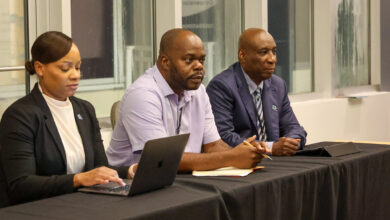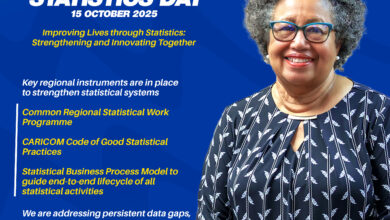(CARICOM Secretariat, Turkeyen, Greater Georgetown, Guyana) As we commence this Nineteenth Ordinary Meeting of the Executive Board in the resilient land of Haiti, I greet you warmly on behalf of the 65 members that comprise the Caribbean Community (CARICOM) established Pan Caribbean Partnership against HIV and AIDS (PANCAP). I wish to join the First Lady of Haiti, Madam Sophia Martelly, in bidding you a warm welcome BIENVENUE!. Indeed, it is a pleasure to have so many of you for the first time in Haiti under the PANCAP umbrella. In a way, it is an expression of inclusivity demonstrating “a partnership for all”. PANCAP and its Secretariat, the PANCAP Coordinating Unit, led by its Director, Ms. Juliette Bynoe-Sutherland, must be commended for this decision.
PANCAP is a collective that is based on goodwill. More than that, it is a Partnership which enables the voice of the Community and Civil Society to be heard at the highest level of decision making. Through the work and expertise of its various partners, its reach is to every Caribbean person infected or affected by HIV and AIDS.
As I have said on other occasions, the achievements of this collective in spite of the challenges, demonstrate that that the whole, indeed, is always greater than the sum of its parts. Since its inception, its resource mobilization efforts targeted to both the national and regional levels have enabled the implementation and monitoring of HIV and AIDS related projects and programmes, designed to reverse the spread of the epidemic.
The Partnership’s care and treatment efforts are well documented. Its advocacy for significantly reduced anti-retrovirals created history when it became the first grouping in a developing region to broker a deal with six pharmaceutical companies, for the significant reduction of ARVs. This achievement which was celebrated at the 2002 Barcelona International AIDS Conference (IAC) drew the acclaim of President Clinton who had only recently established the WJClinton Foundation. That Foundation became a member of PANCAP in October 2002 with the signing of the PANCAP Commitment at the CARICOM Secretariat in Georgetown, Guyana. And these are just two examples of the work of the Partnership since its establishment.
Today, the advocacy continues at many levels and in many fora. As the Latin America and Caribbean Board Member on the Global Fund, I could attest first hand to the critical importance of these advocacy initiatives in an environment of dwindling resources and competing priorities. An environment which mandates that we strengthen our coordination and foster closer integration at all levels.
I believe, however, that despite the international financial crunch there is a sufficient flow of goodwill and understanding of the need to maintain and accelerate the momentum of the PANCAP response, so as not to reverse the gains already made. I echo the opinion expressed by former US President Clinton to the closing session of the just concluded 19th IAC, that countries and partnerships need to be creative, show results and the money will come to support progress to an AIDS free generation.
Many of the items on this agenda speak to creative solutions and the role of dynamic partnerships in the continued response of the Caribbean region.
The Panel Discussion, a first for this forum, on the role of Civil Society Organisations in the integration of HIV programmes into existing health systems or programmes will certainly advance the discussions on the Region’s sustainability. PANCAP is accelerating and heightening its engagement with Civil Society, given its critical importance to the HIV response. A recent study of available SRH /HIV services for key populations[1] found that Sexual and Reproductive Health and HIV services provided to most at risk populations across the region is being led by primarily Civil Society. However, Civil Society was found not to be fully integrated into regional strategies. I therefore look forward to the robust discussion of this panel and its recommendations on the integration of HIV into existing health systems, and the role of Civil Society in this regard.
I look forward also to the decisions of the Partners Coordination Meeting which was held yesterday. I expect this too would offer significant approaches for advancing our efforts at integration and increasing efficiencies as we go forward.
Still on the issue of the important role of Civil Society, partnerships and integrated approaches, I wish to pause here to congratulate the Fondation SEROvie of Haiti for winning the 2012 International Red Ribbon Award (RRA) for prevention of sexual transmission. The RRA is the world’s leading award on innovative and outstanding community work in the AIDS response.
Reviewing and reevaluating our engagement with Haiti could not be more timely. Haiti has made tremendous strides in reversing this epidemic and continues to work very hard to overcome extreme poverty, extremely high unemployment, and other devastating effects of several natural disasters, critical resources are still needed and alternative financing mechanisms are urgently required to reduce the disproportionate dependence on external grants and loans for HIV programming…”.So “resources for AIDS are an investment ,not an expenditure. Health dollars are growth dollars”, as the UNAIDS Executive Director, Michel Sidibe, constantly reminds. We believe that the progress made by Haiti in curtailing the spread of HIV and AIDS is significant and should continue to receive the attention of financial and technical assistance partners at all levels.
In this regard, I expect that the presentation enhancing the Partnership’s engagement with Haiti, will provide crystal clear information on how this engagement could be enhanced and will generate robust discussions and decisions from the wider Partnership on how it could provide assistance in critical areas requiring such.
The report of the recently concluded Donor Resource Mapping Study will certainly shed light on gaps in the HIV response and provide strategic information for HIV planning and programming. And so I look forward to receiving this report. I believe this study is a significant step forward as PANCAP continues to provide a structured and unified approach to the Caribbean’s response, through the streamlining of programmes, projects and partnerships.
In closing I wish to reiterate that our sustainability as a region demand that we constantly review and reevaluate our work as a Partnership. It is only in this way that we could redress the challenges to our sustainability and identify new opportunities for the way forward. Our people deserve no less. We could do it.
Our agenda is a full one for the rest of the day and I do look forward to a productive meeting, I reiterate my pleasure at being here today.
Thank you





